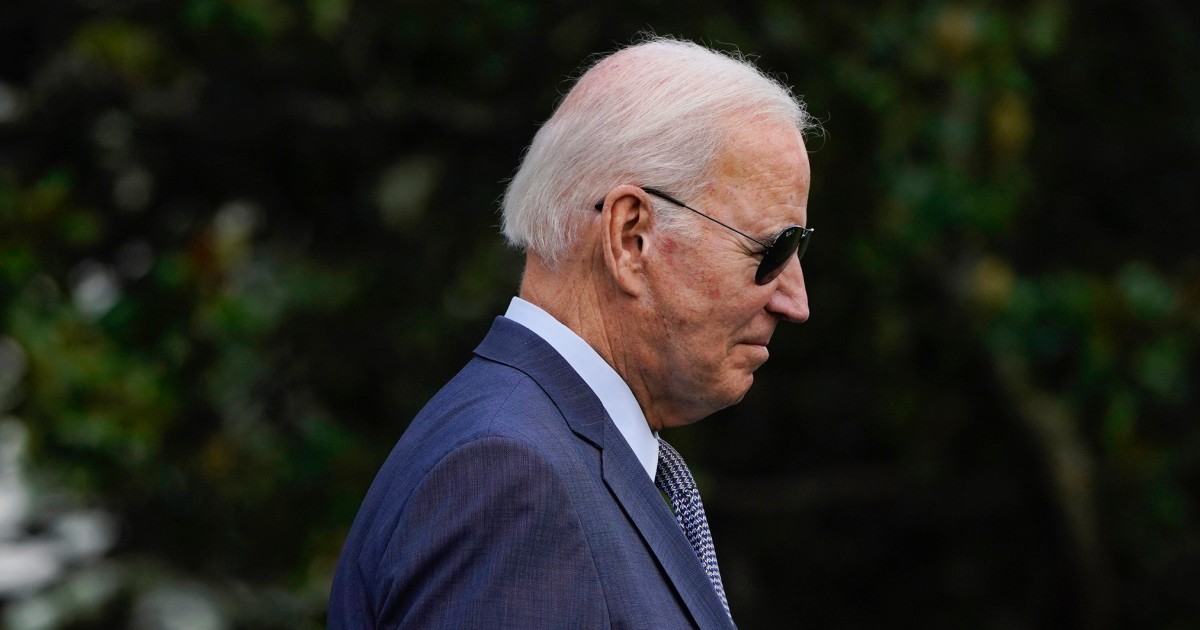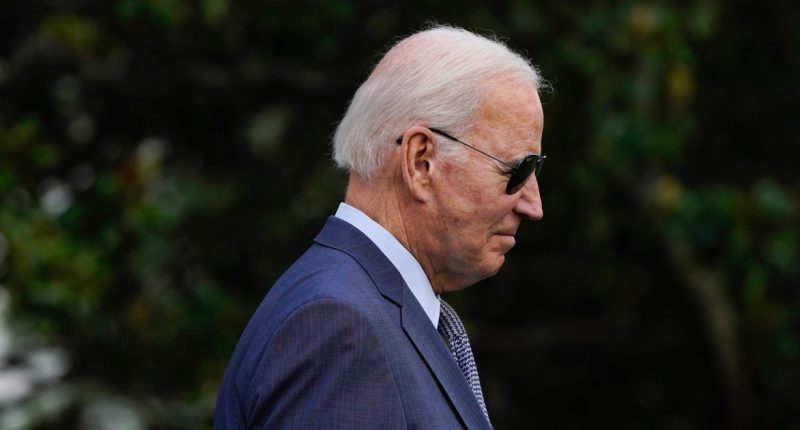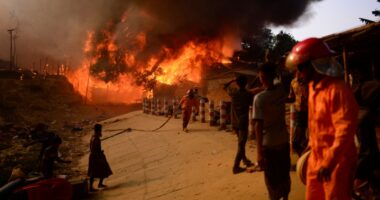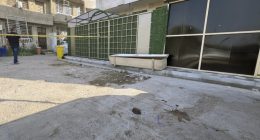
WASHINGTON — It’s the sort of split-screen moment that no White House relishes.
While Maui counted its dead Sunday, President Joe Biden sat on the beach in Delaware, rode his bicycle and said little about the deadliest wildfire to hit the U.S. in a century.
“We’re looking at it,” he said, pedaling past reporters who shouted at him as he whizzed by.
Biden had first delivered remarks last Thursday about the catastrophic fire. The next day, his son became the subject of a federal special counsel investigation. And since then Biden has said virtually nothing to the press — not about Hunter or the fires or anything else.
Four days of silence haven’t gone unnoticed — not by the reporters who pressed White House press secretary Karine Jean-Pierre on Monday about why he has not spoken out more, or by Republicans, who piled on criticism that the president was failing to address the devastation, or by conservative media, who on Tuesday juxtaposed pictures of Biden at the beach with footage of the fires.
Donald Trump, in a video posted between attacks on the prosecutor who indicted him on Monday, released a two-minute video criticizing Biden’s response to the fires.
“It is a disgraceful thing that Joe Biden refuses to help or comment on the tragedy in Maui,” he said.
The White House points to the response on the ground as proof that the Biden administration is taking the catastrophe seriously. Nearly 500 federal workers are deployed in Hawaii. FEMA has provided 50,000 meals, 75,000 liters of water, 5,000 cots and 10,000 blankets. The U.S. Coast Guard and Navy Third Fleet supported response efforts, and the Marines provided Blackhawk helicopters to fight fires.
Biden has also spoken with the state’s governor, Josh Green, and to Sen. Mazie Hirono, a Hawaii Democrat, among other officials.
“We won’t be lectured by Republican officials in Washington who are doubling down on denial of the climate crisis that is devastating red and blue states, who attempted to slash the wildfire response budget, and who defended the Trump Administration cutting Puerto Rico off from hurricane relief,” said Andrew Bates, a White House spokesman.
With the death toll expected to continue to climb, Biden flew to the 2024 battleground state of Wisconsin on Tuesday to mark the first anniversary of an ambitious climate change package that is central to his campaign message. Biden’s trip will place him in front of cameras and a microphone, giving him a chance to address the crisis in fuller detail.
But that hasn’t been enough to silence critics who are seizing on what they see as a potential vulnerability.
The Republican National Committee sent out an email Monday with a picture of Biden sitting in a beach chair in a sandy stretch of Delaware, while “Hawaiians are left to fend for themselves.”
Doug Heye, a former RNC official, called Biden’s relative silence “surprising” and “disappointing.”
Biden had “always been portrayed as somebody who would be a great consoler-in-chief,” Heye said. “And, you know, here we have the deadliest wildfire in our nation’s history, and he’s been silent.”
Having lost a wife and daughter in a car crash and a son to cancer, Biden has embraced the role of soothing those who are in pain, invoking his own experiences to comfort a grieving parent or child. He often promises that the day will come when the memory of a loved one “will bring a smile to your lips before a tear to your eye” — as he said in 2021 during a speech marking the grim milestone of 500,000 dead from Covid-19.
Delivering that kind of reassurance often calls for visiting the scene of the disaster. A White House spokeswoman told reporters Tuesday that officials are having an “active conversation on when a visit to Hawaii might be possible.” Such a presidential trip that poses daunting logistical challenges given the distances and the ongoing efforts to contain the fires and locate more victims.
“We want to make sure that they have, you know, all of the resources and the space that they need and not disrupt operations right now,” Federal Emergency Management Agency administrator Deanne Criswell said at a press briefing on Monday.
Natural disasters test a president’s executive skills and political savvy. Former President George W. Bush was seen as falling short on both counts when Hurricane Katrina ravaged New Orleans in 2005. The storm killed more than 1,300 people, many of who were Black and poor and trapped in the flood waters that rose after the storm had passed.
While far less devastating, a train derailment in East Palestine, Ohio provided a stage for Trump to one-up Biden. The accident in February released toxic chemicals that caused a mass evacuation and stoked fears of wider contamination. No one was killed in that spill, but concerns linger about long-term health consequences.
Trump visited the site a few weeks after the crash, meeting with local officials and sharply criticizing the sitting president for staying away. Though Biden said he, too, planned to visit East Palestine, more than six months later, that trip has yet to materialize.
While in power, Trump faced staunch criticism over his response to a hurricane that devastated Puerto Rico in 2017. While visiting the island, Trump tossed paper towels into the crowd at a relief center, an act seen as insensitive given the scope of the damage.
It often takes time to assess the response on the ground, and whether there were missteps. An inspector general’s report later found that the Trump administration obstructed an investigation into why officials withheld about $20 billion in hurricane relief for the island.
“Ultimately, you’ll be judged by what’s happening on the ground. You can say a lot, but ultimately the mayors and the local officials and governors really don’t care so much about your words, but are you acting on the long list of needs that they’re giving you,” Robert Mann, who was an aide to then-Louisiana Gov. Kathleen Blanco during Hurricane Katrina in 2005, said in an interview.
Getting resources to Hawaii in the coming months could quickly become a partisan fight in Congress. Republicans have historically resisted providing additional spending for disasters, particularly in places that don’t traditionally vote for the GOP.
Sen. Brian Schatz, a Hawaii Democrat, is already starting to make the case that more money is needed.
“We are going to need a bipartisan emergency supplemental appropriations bill that includes significant funding for Hawaii,” he told NBC News. “I’m working with state and local officials, the Biden administration and my colleagues on the Senate Appropriations Committee to make sure Hawaii gets all the federal resources it needs.”
Source: | This article originally belongs to Nbcnews.com









